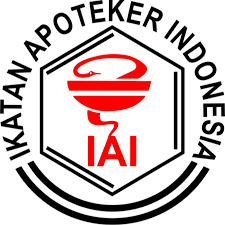Kepatuhan dan Kualitas Hidup Pasien Diabetes Melitus Tipe 2 di Rumah Sakit di Jawa Tengah
Nurul Mutmainah(1*), Muhammad Al Ayubi(2), Anggie Widagdo(3)(1) Faculty of Pharmacy, Universitas Muhammadiyah Surakarta, Indonesia
(2) Faculty of Pharmacy, Universitas Muhammadiyah Surakarta, Indonesia
(3) Faculty of Pharmacy, Universitas Muhammadiyah Surakarta, Indonesia
(*) Corresponding Author
Abstract
Diabetes mellitus is a chronic disease that requires treatment for a long period of time. Adherence to consuming drugs is one of the most important things in achieving treatment goals. This study aims to determine the level of adherence and quality of life and determine the relationship to the quality of life of patients with type 2 DM in hospitals in Central Java. This study uses analytic design by asking cross-sectional. Samples were taken at two hospitals in Central Java. Sampling was purposive sampling with the criteria of type 2 diabetes mellitus patients who are undergoing outpatient care in the hospital, have undergone therapy for at least 3 months, and can communicate well. As a measurement used the Medication Adherence Rating Scale (MARS) questionnaire while the quality of life measure used the Short Form 36 (SF-36) questionnaire. Score data received and quality of life that has been obtained was processed with the SPSS (Product Statistics and Service Solutions) chi-square test. Research results in 200 respondents found 9 people (4.5%) had low adherence, 46 people (23%) were moderately related and 145 people (72.5%) have high adherence. While the quality of life found 41 people (20.5%) had a poor quality of life and 159 people (79.5%) had a good quality of life. The lowest aspect of quality of life is physical limitations and the highest aspect of quality of life is mental health. From the results of the analysis on the chi square test, the p value was obtained: 0.00. This shows that there is a significant relationship between adherence and quality of life in patients with Type 2 diabetes mellitus at the hospitals and a Prevalence Ratio value of 23.47.
Keywords
Full Text:
PDFReferences
Alfian R. and Putra A.M.P., 2017, Uji Validitas dan Reliabilitas Kuesioner Medication Adherence Report Scale (MARS) Terhadap Pasien Diabetes Melitus, Jurnal ilmiah Ibnu Sina, 2 (September), 176–183.
Depkes RI., 2014, Situasi dan Analisis Diabetes, Jakarta
Dewi N.A., Susanto Y. and Wahyudi B., 2018, Kepatuhan Minum Obat dan Kualitas Hidup
Pasien Diabetes Melitus di Depo BPJS Rawat Jalan RSUD Ulin Banjarmasin,
Felicia, 2017, Hubungan antara depresi dengan kualitas hidup pada pasien diabetes melitus tipe 2 di Puskesmas Amplas Medan,
Hasina R., 2014, Hubungan tingkat kepatuhan dan kepuasan terapi dengan kualitas hidup pasien usia lanjut diabetes mellitus tipe 2 di klinik Geriatri RSUP dr Sardjito Yogyakarta, , 338429.
Miller T.A. and Di Matteo M.R., 2013, Importance Of Family/Social Support and Impact on Adherence To Diabetic Therapy. Dovepress Journal, 6, 421-426.
Naafi A.M., Perwitasari D.A. and Darmawan E., 2016, Kepatuhan Minum Obat Pasien Rawat Jalan Skizofrenia Di Rumah Sakit Jiwa Prof.Dr.Soerojo Magelang, Kartika Jurnal Ilmiah Farmasi, 4 (2), 7–12.
Ningrum W.A.C., Hidayati T. and Rahmah, 2016, Kualitas Hidup Pasien Urolithiasis pada Komponen Fisik dan Komponen Mental dengan Instrumen Short Form-36 (SF-36), Jurnal Care, 4 (2), 53–63.
Perkumpulan Endokrinologi Indonesia, 2015, Konsensus Pengelolaan dan Pencegahan
Diabetes Melitus Tipe 2 di Indonesia 2015, PERKENI, Indonesia.
Rachmawati Y., Perwitasari D.A. and Adnan, 2014, Validasi Kuesioner SF-36 Versi Indonesia Terhadap Pasien Hipertensi Di Puskesmas Yogyakarta, Jurnal Farmasi Indonesia, 11 (01), 14–25.
Rasdianah N., Martodiharjo S., Andayani T.M. and Hakim L., 2016, The Description of Medication Adherence for Patients of Diabetes Mellitus Type 2 in Public Health Center Yogyakarta, Indonesian Journal of Clinical Pharmacy, 5 (4), 249–257.
Setyorogo S. and Trisnawati S.., 2013, Faktor Resiko Kejadian Diabetes Melitus Tipe II Di Puskesmas Kecamatan Cengkareng Jakarta Barat Tahun 2012, Jurnal Ilmiah Kesehatan,
(1), 6–11.
World Health Organization, 2016, Global Tuberculosis Report, Law, I., ed., WHO Library Cataloguing-in-Publication Data, Geneva, Swtzerland.
Article Metrics
Abstract view(s): 5745 time(s)PDF: 6832 time(s)
Refbacks
- There are currently no refbacks.








